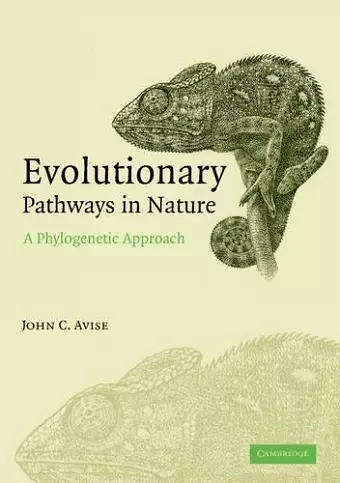Evolutionary Pathways in Nature
A Phylogenetic Approach
Format:Paperback
Publisher:Cambridge University Press
Published:4th May '06
Currently unavailable, and unfortunately no date known when it will be back

Uses phylogenetic analyses to understand evolutionary pathways; packed with fascinating examples from across the animal kingdom.
This book provides a non-technical introduction to how phylogenetic analyses can be used to understand evolutionary pathways. The author escorts readers on historical journeys into the origins of many of nature's most intriguing evolutionary outcomes, from the toucan's enormous bill to pregnant male seahorses.Reconstructing phylogenetic trees from DNA sequences has become a popular exercise in many branches of biology, and here the well-known geneticist John Avise explains why. Molecular phylogenies provide a genealogical backdrop for interpreting the evolutionary histories of many other types of biological traits (anatomical, behavioral, ecological, physiological, biochemical and even geographical). Guiding readers on a natural history tour along dozens of evolutionary pathways, the author describes how creatures ranging from microbes to elephants came to possess their current phenotypes. Essential reading for college students, professional biologists and anyone interested in natural history and biodiversity, this book is packed with fascinating examples of evolutionary puzzles from across the animal kingdom; how the toucan got its enormous bill, how reptiles grow back lost limbs and why Arctic fish don't freeze.
'This is such a marvelous accomplishment that I would recommend to all, with even the slightest interest in evolution, buying the hardcover version to keep for a long time as standard reference to a phylogenetic understanding of structure and function in living organisms. I would especially recommend it to medical geneticists grappling daily with the (self-evident) fact that everything that develops, whether normal or abnormal, has evolved, and that nothing can occur in development that evolution has not made possible … [the book] is an extraordinarily effective means to learn about and to understand evolutionary relationships. It is one of the best-written and most comprehensive books on the subject.' American Journal of Medical Genetics
'John Avise's book … is a welcome corrective. It is a rich anthology of 'evolutionary short stories' detailing how our knowledge of natural history and biodiversity has been transformed by molecular phylogenetics. The breadth of examples covered is dizzying … The abundance of fascinating evolutionary tales and the engaging clarity with which Avise tells them not only guarantee that this book will serve its purpose but also make it a 'must-have' for all enthusiasts of evolutionary biology.' Nature Genetics
'A hugely enjoyable and accessible read, cleverly pitched such that newcomers and seasoned systematists alike will feel equally at home … As a reference source, every library should have a copy, and anyone teaching or studying evolutionary biology will find it an invaluable mine or examples.' The Systematist
'The book provides a refreshing and thrilling reading and can be recommended as a useful introduction to phylogenetic character mapping conceived as a powerful interpretative tool for many types of ecological and evolutionary study.' Folio Geobotanica
'… this book should be on every biological library shelf, from secondary school up to University Biology …' Biologist
ISBN: 9780521674171
Dimensions: 247mm x 173mm x 15mm
Weight: 614g
298 pages